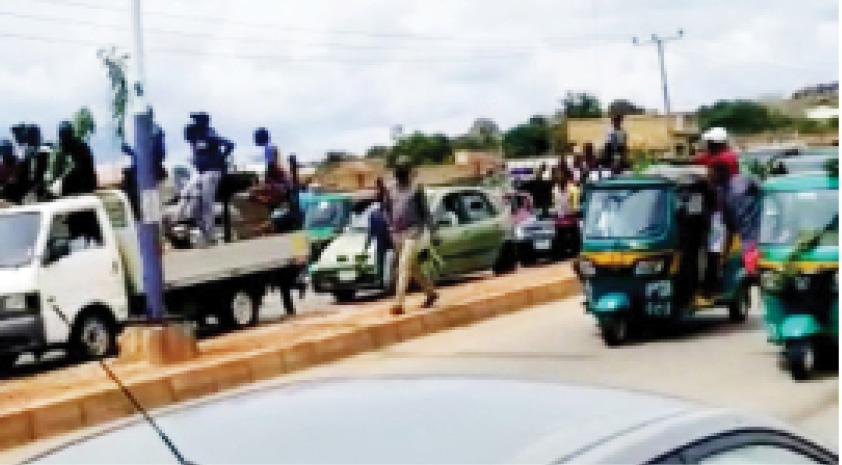Calls for moderation of burial processions in Jos heightened
In Africa, burial processions are expected to be solemn, mournful and orderly. But in many occasions in some places, such activities have been misrepresented; hence moments of disorderliness and chaos are seen even on highways, thereby causing traffic congestions and discomfort to road users. In some cases, it also leads to violent conflicts that result […]

One of such processions
In Africa, burial processions are expected to be solemn, mournful and orderly. But in many occasions in some places, such activities have been misrepresented; hence moments of disorderliness and chaos are seen even on highways, thereby causing traffic congestions and discomfort to road users. In some cases, it also leads to violent conflicts that result to killings and destruction of property.
In recent times in Jos, the Plateau State capital, chaotic burial processions are often witnessed, particularly if it is connected to victims of attacks or some worrisome circumstances. Unfortunately, it has gotten to a point where it is becoming a norm.
- World Press Freedom Day: Media stakeholders demand constitution amendment
- 2023 presidency: Northern elders flay threats by southern groups
Daily Trust Saturday learnt that burials in Jos took a dangerous dimension as a result of the over 20 years of ethno-religious violence in the city and the state in general. The conflict, which began in 2001, however, subsided drastically recently, but its impact has polarised the people along ethno-religious lines. The Jos-Bukuru metropolis in Jos North and Jos South local government areas is the most affected.
Apart from anger emanating from killings, other times people are harassed along the way, no matter their status, a situation that often leads to violence.
It is common to see members of different communities come into the city in large convoys of motorcycles, tricycles and other vehicles to either the Plateau Specialist Hospital or the Jos University Teaching Hospital (JUTH) to pick corpses for burial.
Apart from the traffic congestion caused during such times, sometimes friction ensues between the people carrying out the procession and others, which sometimes leads to destruction of lives and property, especially if there’s no timely intervention of security agents.
In early March, for example, one person died in Bukuru, Jos South when some people on burial procession had a confrontation with a truck driver. This happened before the situation was brought under control.
During the confrontation, some residents of a nearby street came out and supported the truck driver, a situation that further degenerated before security operatives came and dispersed them. Unfortunately, one of the boys had already lost his life.
Another incident that shook the state was the killing of travellers from Bauchi State to Ondo last year. It was said that the victims ran into some angry youths on burial procession for their wards who were killed by unidentified gunmen.
The procession, which took off from a Jos hospital, was heading to Miango district of Bassa Local Government Area before the unfortunate incident took place. Many of the travellers also sustained various degrees of injury during the incident. This particular incident stirred serious tension in the city, even as there were violent attacks in some parts of the state.
Some residents of Jos who spoke on the situation lamented its effect on residents and suggested what could be done to put it under control.
The chairman of Jos North Youth Leaders Forum, Joshua Iku Akubaka, said the processions were not always well coordinated; hence they are often hijacked by youths under the influence of drugs or other dangerous substances.
He also said that mistrust between Christian and Muslim youths leads to violence, citing an incident in 2017 involving a Christian boy’s corpse that was found around the Farin Gada area. In the process of taking the boy to the burial ground, confrontation ensued between youths of both faiths in the area. He added that both groups are always blaming each other whenever death occurred.
Akubaka called on residents of the community to be law-abiding and stop confronting those on burial processions, especially when their peace and security are not breached. He added that even when that happens, the appropriate authorities should be contacted to handle the situation as no group is permitted to take laws into their hand.
The youth leader said there was the need for permission and security cover from law enforcement agents for all the processions so that motorists/road users or passersby would be protected, and so that there won’t be any traffic congestion during such periods.
He recalled the incident that happened in Gombe State few years ago, where some members of the Boys’ Brigade were on procession to bury one of their members and a motorist rammed into them, killing many. He said such incident wouldn’t have happened if the members of the Boys’ Brigade had a security cover.
A resident of the Zamarganda area of Jos, Josephine Ayuba, also said caution should always be taken during burial processions, regardless of religious or cultural beliefs due to the sensitive nature of the city, which has gone through many turbulence in recent years and still very sensitive to anything with ethno-religious inclination or colouration.
Another resident of Bauchi Road, Abubakar Hassan, said the processions would often escalate because some of those taking part in it must have lost loved ones and are already agitated.
He called on stakeholders, government at all levels and the masses to join hands in making the state safe and a better place. He added that once peace building roles are played across board, it would stimulate understanding and tolerance among the people.
Reacting, the police public relations officer in the state, ASP Ubah Gabriel Ogaba, said people had the right to peaceful protest and procession, but they should obtain police permit before embarking on such activities.
